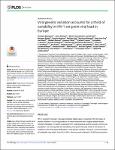Viral genetic variation accounts for a third of variability in HIV-1 set-point viral load in Europe
Blanquart, François
Wymant, Chris
Cornelissen, Marion
Gall, Astrid
Bakker, Margreet
Bezemer, Daniela
Hall, Matthew
Hillebregt, Mariska
Ong, Swee Hoe
Albert, Jan
Bannert, Norbert
Fellay, Jacques
Fransen, Katrien
Gourlay, Annabelle J.
Grabowski, M. Kate
Gunsenheimer-Bartmeyer, Barbara
Günthard, Huldrych F.
Kivelä, Pia
Kouyos, Roger
Laeyendecker, Oliver
Liitsola, Kirsi
Meyer, Laurence
Porter, Kholoud
Ristola, Matti
Sighem, Ard van
HIV-1 set-point viral load—the approximately stable value of viraemia in the first years of chronic infection—is a strong predictor of clinical outcome and is highly variable across infected individuals. To better understand HIV-1 pathogenesis and the evolution of the viral population, we must quantify the heritability of set-point viral load, which is the fraction of variation in this phenotype attributable to viral genetic variation. However, current estimates of heritability vary widely, from 6% to 59%. Here we used a dataset of 2,028 seroconverters infected between 1985 and 2013 from 5 European countries (Belgium, Switzerland, France, the Netherlands and the United Kingdom) and estimated the heritability of set-point viral load at 31% (CI 15%–43%). Specifically, heritability was measured using models of character evolution describing how viral load evolves on the phylogeny of whole-genome viral sequences. In contrast to previous studies, (i) we measured viral loads using standardized assays on a sample collected in a strict time window of 6 to 24 months after infection, from which the viral genome was also sequenced; (ii) we compared 2 models of character evolution, the classical “Brownian motion” model and another model (“Ornstein–Uhlenbeck”) that includes stabilising selection on viral load; (iii) we controlled for covariates, including age and sex, which may inflate estimates of heritability; and (iv) we developed a goodness of fit test based on the correlation of viral loads in cherries of the phylogenetic tree, showing that both models of character evolution fit the data well. An overall heritability of 31% (CI 15%–43%) is consistent with other studies based on regression of viral load in donor–recipient pairs. Thus, about a third of variation in HIV-1 virulence is attributable to viral genetic variation.
Dateien zu dieser Publikation
Keine Lizenzangabe

